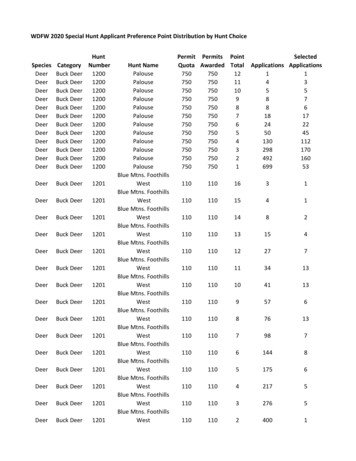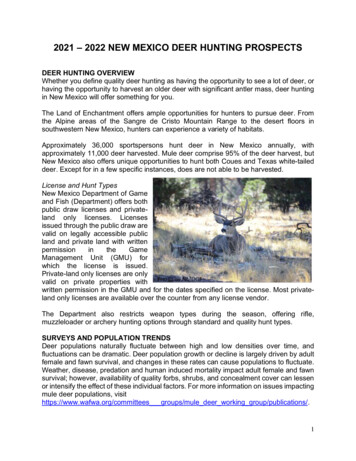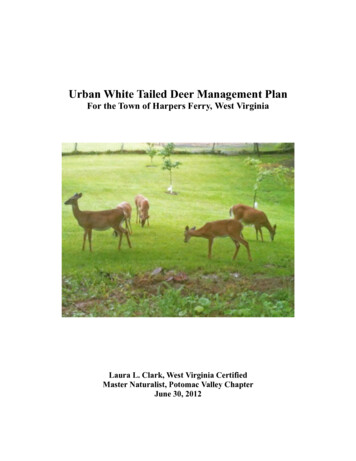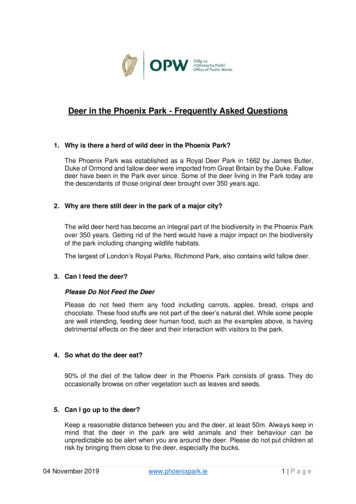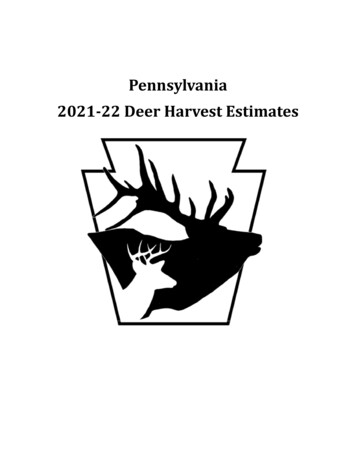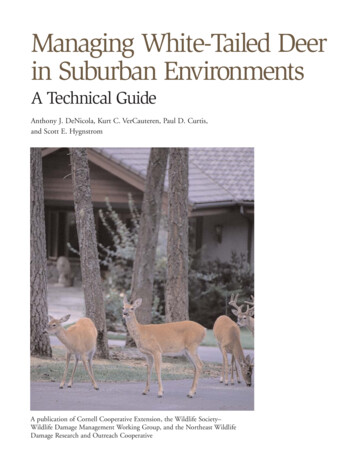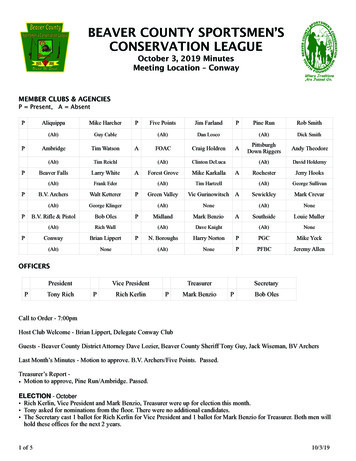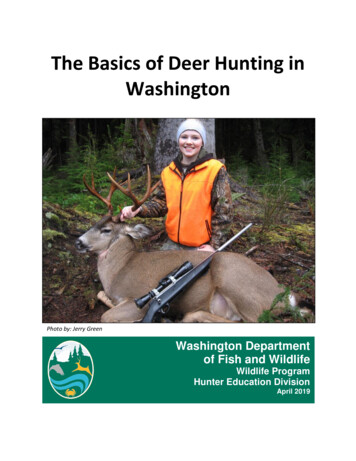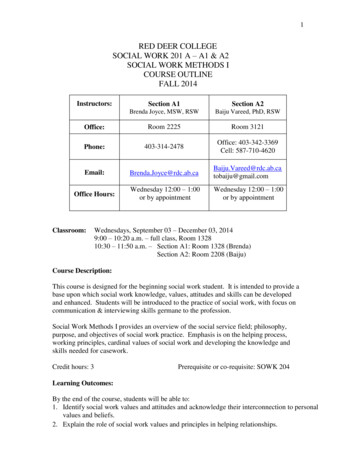
Transcription
1RED DEER COLLEGESOCIAL WORK 201 A – A1 & A2SOCIAL WORK METHODS ICOURSE OUTLINEFALL 2014Instructors:Section A1Section A2Brenda Joyce, MSW, RSWBaiju Vareed, PhD, RSWOffice:Room 2225Room 3121Phone:403-314-2478Office: 403-342-3369Cell: ed@rdc.ab.catobaiju@gmail.comOffice Hours:Wednesday 12:00 – 1:00or by appointmentWednesday 12:00 – 1:00or by appointmentClassroom:Wednesdays, September 03 – December 03, 20149:00 – 10:20 a.m. – full class, Room 132810:30 – 11:50 a.m. – Section A1: Room 1328 (Brenda)Section A2: Room 2208 (Baiju)Course Description:This course is designed for the beginning social work student. It is intended to provide abase upon which social work knowledge, values, attitudes and skills can be developedand enhanced. Students will be introduced to the practice of social work, with focus oncommunication & interviewing skills germane to the profession.Social Work Methods I provides an overview of the social service field; philosophy,purpose, and objectives of social work practice. Emphasis is on the helping process,working principles, cardinal values of social work and developing the knowledge andskills needed for casework.Credit hours: 3Prerequisite or co-requisite: SOWK 204Learning Outcomes:By the end of the course, students will be able to:1. Identify social work values and attitudes and acknowledge their interconnection to personalvalues and beliefs.2. Explain the role of social work values and principles in helping relationships.
23. Recognize the various roles and fields of practice in which social workers are involved.4. Employ communication skills appropriate for effective social work interviewing.5. Discuss cultural competency and its applications in social work practice.6. Identify the objectives and format of an initial social work interview.7. Discuss communication barriers that can impede the helping relationship.8. Reflect upon their effectiveness in helping situations through awareness of self and skills.9. Construct professional social work documentation.10. Distinguish the interview process from opening to closing.11. Attend to the use of self and boundaries in helping relationships.Course Topics:Time will be spent discussing what social work is, the arenas in which social workers practice and theirroles. Cultural competency is integrated as a foundational component of the helping relationship. Thebalance of the term will be focused on developing effective communication skills and employing them ininitial social work interviews. Guidelines for social work recording will also be discussed. Students willbe asked to share beliefs and experiences, participate in small group discussions, and develop beginningmechanisms for reflective social work practice.Learning Activities:Students are invited to engage with learning in this course through lectures, videos, role-plays,activity-based learning and class discussions. Activities and skill development occur through smallgroup work at times during the extent of the course.Approaches to Learning and Practice:Social work education not only imparts knowledge, develop skills and construct the right attitude, butfocus on the individual learner through self-reflective process to mould the social worker in him/her. Istrongly believe in engaging the student at every stage of course and learn from situations around thelife around them. Recognizing the individual differences in learning and appreciating the uniqueness,I follow a student first approach, which ensure that I would be always accessible to students. BaijuAs a social worker, I am grounded in principles of self-determination of the client, and meeting theindividual where she or he is at to join them in the journey. This means that clients make their ownchoices, and I start wherever the person and their reality is at that time, or that day in their life. As aneducator, I believe learning is a journey, and similar principles apply. I look forward to walking withyou on the journey you choose this term.BrendaTexts Required:Hepworth, D.H., Rooney, R.H., Dewberry Rooney, G., Strom-Gottfrried, K. & Larsen, J. (2013). Directsocial work practice: Theory & skills (9th ed.). Belmont, CA: Brooks/Cole.Cummins, L., Pedrick, L., Sevel, J. (2012). Social work skills demonstrated: Beginning directpractice(3rd ed.). Boston, MA: Allyn and Bacon.
3Evaluation:1.Professional Conduct (total value 10%)As learning professionals, students are encouraged to adopt behaviours and practices within thelearning environment that encourage successful studies as well as prepare them for professionalsocial work practice. To support this, a mark of 10% will apply to professional conduct, consistingof student self-assessment (5%) and instructor assessment (5%). Feedback in the form of formativewritten comments will be provided to the student at midterm.The demonstration of professionalism begins with developing the awareness of the characteristicsand qualities that promote professional conduct, and how this is demonstrated in the classroomlearning environment. Students will have opportunities to learn about and demonstrate respectfulrelationships, collegiality, reflective thinking, and engaged learning. Specific details and theassessment rubric will be shared in class.2.Exercises: (total value 60%)Designated exercises will be distributed in class or be assigned from the Social Work SkillsDemonstrated workbook and will coincide with content from the textbook and class, as well astopics of discussion. The purpose of the exercises is for you to demonstrate that you are able toreflect upon and apply the concepts that are presented. It is recommended that you complete theexercises following the class that focuses on the topic. Exercises will be distributed and are dueaccording to the following schedule:Exercise:12343.Date Distributed:Handout - September 10, 2014Workbook: Pages 316 – 334ANDPages 351 – 361EVEN numbers OnlyWorkbook: Pages 334 – 351ANDPages 361 -367ODD numbers onlyHandout – October 22, 2014Due Date:September 24, 2014Value:October 08, 201415%October 29, 201415%November 12, 201415%15%Case Study Interview Recording (DVD) and Critique: (total value 30%)You will record a role play interview of an initial interview from beginning to end (20-30minutes in length) using a scenario of your choice. You will complete a process recording of aportion of the interview. The tasks are for you to:a.b.c.Process record what you said to the clientIdentify the social work skill(s) you usedProvide a rationale for your statements and alternatives where applicableYou will develop a critique that examines your interviewing skills, and your critique willidentify strengths and areas for improvement.It is expected that this assignment will be 10 to 15 pages typewritten, double-spaced.
4Further written details will be provided on October 29 in class and via Blackboard.Due: December 3, 2014Midterm Feedback: Midterm feedback for this course will be available October 24, 2014. Afterreviewing their marks to this point, students should make an appointment with the instructor todiscuss their progress and concerns if the cumulative total to this point is less than 16.5 marks outof 30. The instructor is also available prior to this during designated office hours or by appointmentif students have any concerns.Class Participation & Attendance:Class participation includes attendance, prior reading of proposed texts and engagement with the class.Learning about social work involves more than reading a textbook. Discussions and interactions withothers are vital to your understanding of social work practice and yourself. To fully benefit from thiscourse and work effectively with your colleagues, your attendance is required. Accordingly, at thediscretion of the instructional team, more than three (3) unaccounted absences will result in a failinggrade and/or reduced mark. It is essential and expected that readings be completed prior to coming toclass.Late Assignments:Assignments are due on the due date at the beginning of class – 9:00 a.m. In the event of unforeseendifficulties, you need to contact your section instructor well in advance of the due date to discussalternatives. Extensions are not granted on the due date. Late assignments without prior instructor contactand agreement will be penalized at 5% of the assignment per day. As a general rule, assignments will notbe accepted more than two weeks after the original due date, nor will extensions be granted if requested onthe due date.Final Examination:The RDC Final Examination Policy will be followed with respect to final examinations. Please review thisdocument to ensure that you understand the contents and implications of the policy.Grade Reappraisal:Any student seeking a reappraisal of his or her grade must discuss this with the instructor within two weeksof the work being returned. If the student is not satisfied with the outcome of that discussion, furtherdiscussion may be had with the Program Lead, and if necessary the Associate Dean, Department ofHumanities & Social Sciences and Social Work.Grading Scale:GradeA AAB BBC Grade Points4.04.03.73.33.02.72.3Percent Value*90 – 10085 – 8980 – 8475 – 7970 – 7465 – 69DescriptionExceptionalExcellent PerformanceGood Performance
5CCD DF2.01.71.31.00.060 – 6456 – 5953 – 5550 – 5200 – 49Satisfactory PerformancePassFail*NOTE: A grade of A will generally be the top grade in a course, with A being reserved for recognition ofexceptional achievement.Important DatesFall 2014September 1September 2September 3September 11September 11October 1October 7October 13October 24November 10November 10November 11November 12December 3December 3December 8-13December 16December 19December 22December 24January 17, 2015Fall Term 2014 coursesLabour Day 2014; College closed.New Student Orientation 2014.First day of classes for Fall term 2014 and Full-Year 2014-2015 courses.Last day to register late or add/drop Fall term 2014 and Full-year 2014-2015 courses.Last day to have tuition refunded for Fall term 2014 and Full-Year 2014-2015courses.First day to apply for Fall term 2015.Emergency Response Day.Thanksgiving Day; College closed.Midterm feedback date for Fall term courses.Final exams schedule posted for Fall term 2014.College open. No credit classes.Remembrance Day; College closed.Credit classes resume Fall term 2014.Last day to withdraw from Fall term courses and receive a WD.Last day of classes for Fall term.Final exams written.Deferred exams for Fall term 2014 written.Last day for submission of final grades for Fall term courses.Final grades available.College closes at noon; reopens January 2, 2015Supplemental exams for Fall term 2014 written.Course Outline:It is the student’s responsibility to be familiar with the information contained in this course outline and toclarify any areas of concern with the instructor.No changes will be made to this course outline without the consent of the class and the approval of theAssociate Dean of the Department of Humanities & Social Sciences and Social Work.STUDENT RECOGNITION OF PLAGIARISM*:Standards of ProofPlagiarism can be judged to have occurred if the instructor has both the material presented by the student andthe original source from which this material was taken.Also, plagiarism can be judged to have occurred if the student is incapable of explaining the terminology or ideas in the submitted material if such terminology or ideas cannot be shown to originate in the works contained in the Bibliography,
6References, or Works Cited page accompanying the submitted material (or, for oral presentations, if thestudent cannot produce the notes or texts used to prepare the presentation).Consequences: A student charged with plagiarism may be given a reduced mark or no mark (that is, a grade of 0 or F) for the plagiarized assignment, or be assigned a final grade of F, or be expelled from the course and assigned a final grade of F.In all of the above cases, the instance of academic dishonesty will be recorded on the student’s academicfile.PROCEDURE1. If an instructor discovers or suspects academic misconduct, the instructor provides evidence of themisconduct to the student and takes disciplinary action up to and including the assignment of a failing gradefor the work involved in the misconduct.2. If the instructor feels that the misconduct warrants more serious consequences, the Program Lead isinformed. The decision to remove the student from the course or to assign a failing grade in the course as aconsequence of the misconduct may be taken by the Program Lead in consultation with the Associate Deanupon reviewing the evidence of the misconduct and determination that the violation warrants such action.3. If the instructor and Program Lead determine that the violation requires more significant action such asremoval from a program or from the College, the evidence is presented to the Associate Dean for a decision.4. In each case, the decision and disciplinary action are communicated to the student in writing and a copy isprovided to the Registrar who places it in the student’s file.(*adapted from RDC’s policy on Student Misconduct: Academic and Non-academic - see section below oncollege policies)College Policies:Students should be familiar with what constitutes misconduct, as well as its consequences. This may includeacademic misconduct, which includes plagiarism and cheating, or non-academic misconduct, where studentbehaviour is deemed unsafe or disruptive. Plagiarism may involve the act of submitting work in which someor all of the phrasing, ideas, or line of reasoning are alleged to be the submitter’s own but in fact werecreated by someone else. Cheating involves attempts to obtain unsanctioned assistance in a formal academicexercise. Students should familiarize themselves with the Policy on Academic Misconduct: academic andnon-academic. Penalties for such misconduct range from academic sanctions on assignments or a course toremoval from the College.Students should refer to the Student Appeal, Formal and Informal Resolution Process Policy should theyhave questions or concerns about the course outline that cannot be resolved with the instructor.At all times, the Final Examinations Policy will be followed.This course may be eligible for Prior Learning Assessment. Students should refer to the RDC Calendar for alist of excluded courses.Classroom learning resources may be available to students in alternate formats.The various RDC Academic Policies described above can also be found here.Academic Resources on Campus:Students should be aware that Personal Counselling, Career, Learning, and Disability Services are providedby RDC. Students may inquire about locations at the Information Desk. It is the student’s responsibility todiscuss their specific learning needs with the appropriate service provider.
7Learning Support (Library: 403-342-3264, help learn@rdc.ab.ca ) Writing Skills Centre (writingskills@rdc.ab.ca) Math Learning Centre (mathlearningcenter@rdc.ab.ca) Learning Strategies (note-taking, studying and exam-writing strategies) Peer-Assisted Study / Tutoring (one-on-one tutoring by students)Disability Services (Library: 403-357-3629, disabilityservices@rdc.ab.ca) Coordination of services (tutoring, alternate format text, note-taking and so on.) Academic accommodations, including exam accommodationsCounselling and Career Centre (Room 1402: 403-343-4064, counselling@rdc.ab.ca)Tim Heath, PhDAssociate Dean, School of Arts & ScienceApproved 2 September 2014
8Weekly Discussion Topic, Readings and Assignment DeadlinesDirect SocialWork PracticeSocial WorkSkillsDemonstratedClass DateDiscussion Topic/ActivitySeptember 03Introduction to the course, readingsand assignmentsSeptember 10What is social work? Social workphilosophy & scope of practiceCh. 1, 2Ch. 1September 17Generalist practiceThe helping processCh. 3Ch. 2 & 3September 24Cultural CompetenceOctober 01Communication SkillsCh. 5 & 6Ch. 5October 08Communication Skills 2Ch. 5 & 6Ch. 6Ch. 4AssignmentExercise #1DistributedExercise#1DueExercise #2(Workbook)DueOctober 15Communication Barriers andSolutionsOctober 22Social Work RecordingOctober 29The Initial Interview &Pre-EngagementNovember 05Interview ProcessNovember 12Interview Process - InitialAssessmentNovember 19Interview Process – TerminationNovember 26Relationship buildingEffective use of selfDecember 03Endings/EvaluationsCh. 7Ch. 3 (45-55)Ch. 7Appendix AExercise #4DistributedCh. 8Exercise #3(Workbook)DueCase StudyDistributedPages 90-99Ch. 8Ch. 9Exercise # 4DueCh. 12Additional reading material will be available via Blackboard (BB). Assignments 1& 4 will be available on BB by the date stated above.Case StudyDue
Brenda Joyce, MSW, RSW A2 Baiju Vareed, PhD, RSW Office: Room 2225 Room3121 Phone: 403 -314 2478 Office: 403-342-3369 587 -710 4620 Email: Brenda.Joyce@rdc.ab.ca Baiju.Vareed@rdc.ab.ca tobaiju@gmail.com Office Hours: Wednesday 12:00 - 1:00 or by appointment Wednesday 12:00 - 1:00 or by appointment
